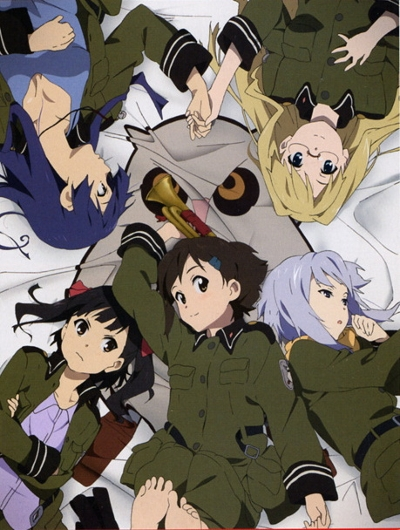In which soldiers do un-soldier-like things.

In Sora no Woto, all five of the main characters are soldiers. Despite the comfortable, relatively untroubled lives they lead from day to day, reminders of their past and current realities of military service are always present. But presence isn’t the same as prominence, and you could be forgiven for forgetting that Seize’s remote bastion is an army outpost. Festivals, local crafts and trade, and the lighthearted, mundane tasks of peace-time duties pass by almost blissfully, only occasionally puncuated by exercises of a more urgent character.
Even so, as distant as it seems as Kanata squawks on the trumpet, the end of the world is coming. The Earth is slowly consuming itself into desert, and meanwhile mankind’s petty hostilities threaten to leave the land barren long before the arrival of nature’s gradual destruction. The first movement of the symphony has been played in the war of the past, and humanity at large seems eager to play a second that will herald the coming of a silent third to leave the piece incomplete.

Writer Hiroyuki Yoshino (Macross F, Guilty Crown, Code Geass) has been accused of many things. Subtly is not usually one of them. But in Sora no Woto, there is a real delicacy at work. Aside from the climactic episodes of the TV anime proper, only faint shadows of darkness flicker across the peaceful days of the 1121st Platoon, hints of unhappy pasts and unhappy futures. At times, they might even be too faint, despite the weight and depth they lend to Filicia, Rio, Kureha, and, eventually, Noel.
When these hints at last consolidate out of the background into an actual sustained threat to Kanata and co.’s way of life, it makes sense, but it also doesn’t stop the preceding episodes from feeling somewhat unfocused. Is Sora no Woto the kind of broad drama that a war only a few hundred yards away from being consummated belongs in? Is it a K-On! successor with military trappings as its gimmick? Is it Macross Zero? Or is it something more supernatural than both of those? In the end, it’s probably all of the above, and frankly it’s good enough at each mode that none of them are articulated to full satisfaction.
It’s a structural issue in a show otherwise carried with true grace by its endearing leads, but it’s as good a problem to have as any—and certain better than many others. To be too good at too many things is a pretty way to be flawed.

Thankfully, this doesn’t stop Sora no Woto from being entertaining or moving. Structurally vague as it may be, there’s still a fluidity to the way it vacillates from one mode to another. Filicia’s character, in particular, serves as a nexus around with the danger-free slice-of-life antics and the gravity of a world not fully not at war revolve. Her stated desire to preserve peace for her junior officers—which comes conveniently right at the halfway point of the show—might very well be the show’s entire thematic statement summed up in a line: “I never want those children to have the same memories I do.” Said another way: Let war never touch these lands again.
The world around her might be scarred with terrible memories, but Filicia hasn’t given up on finding healing. The world might be lusting for more tragedy, but she’ll be damned if she doesn’t do everything in her power to prevent it. It’s not very soldier-like; it might even be downright civilian.
So in a world where music is the exclusive realm of the military, it’s profound that it is not the sound of a familiar military sequence—the notes of the ceasefire are ignored—that manages to delay the impending battle long enough for Rio, at last embracing what she can do, to arrive. Instead, it’s “Amazing Grace.” The song’s never actually named as such in the show, but it’s familiar to the foot soldiers of both Rome and Helvetia, paralleling the widespread popularity of the tune in the real world. As Kanata muses about the captured Aisha, “Romans aren’t any different than we are.”

This means that the climax of Sora no Woto is not simply a Macross-style exercise in the power of music being used to put an end to war, but a celebration of the unique strength of that which is civilian. The townspeople prevent Hopkins’ forces from going the easy way to the battlefield. A tune out of time, out of step with the militaristic mores of its contemporary context, causes the forces of war to pause. These are the small weights we all have at our disposal, and so Kanata releasing the resonating sound might also be seen as rehabilitation of the the role of humanity in accomplishing peace.
War is a human invention, but one might just as easily say that peace is as well. If humanity is capable of war, then it must in turn be capable of peace, or so Sora no Woto seems to say. In other words, our lives are most certainly more than conflict—and in believing that truth, we can fumble our way toward making it a reality. The sound of that hope can ring in the sky for as long as we are willing to play and as long as we are willing to listen.

P.S. Michiru Oshima is a musical goddess and you should all respect her.




